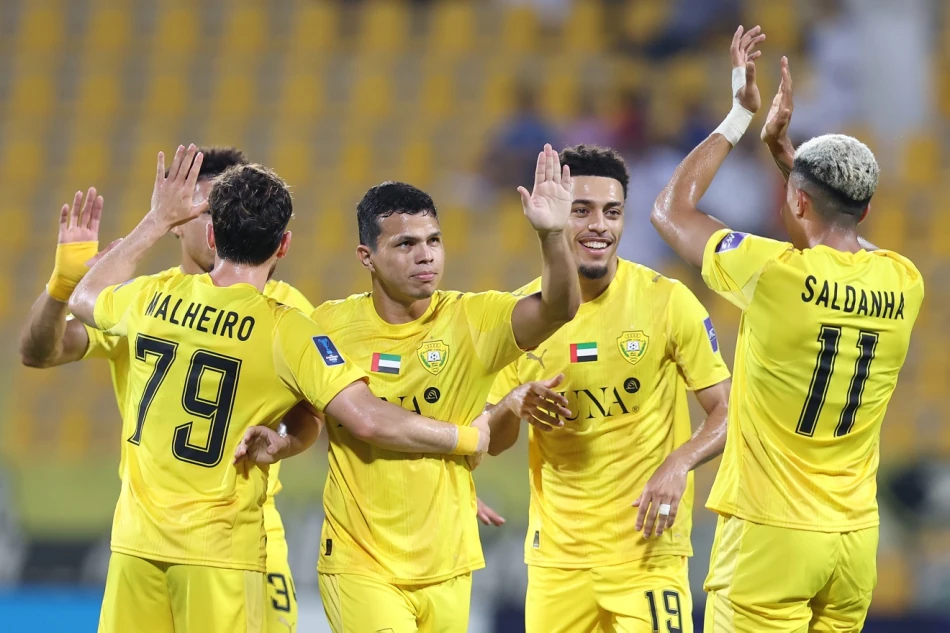
UAE Teams' Victories Inspire National Squad Ahead of World Cup Playoff
UAE Club Success Sets Stage for Crucial World Cup Qualifying Push
As UAE clubs deliver commanding performances in Asian continental competitions, the momentum could prove pivotal for the national team's World Cup 2026 qualifying campaign. With Al Wasl's emphatic 7-1 victory over Iran's Esteghlal highlighting a broader surge in Emirati football, the timing couldn't be better as the national squad prepares for decisive playoff matches against Oman and Qatar next month.
Continental Dominance Builds National Confidence
The UAE's club scene is experiencing a golden moment across Asian competitions. Al Wasl's demolition of Iranian powerhouse Esteghlal in the AFC Champions League 2 was the exclamation point on an impressive opening round that saw Al Wahda defeat Saudi Arabia's Al Ittihad and Sharjah overcome Qatar's Al Gharafa.
Al Wasl midfielder Fabio Lima emphasized the psychological impact of these results, noting how they demonstrate that "UAE clubs are capable of competing continentally and are among the best and strongest clubs in Asia." This isn't mere optimism—it reflects a structural improvement in Emirati football that has been building over recent seasons.
Investment Paying Dividends
The UAE's football authorities have invested heavily in infrastructure, coaching, and player development over the past decade. These continental results suggest that investment is materializing into competitive advantage at the highest levels of Asian football.
World Cup Dreams Within Reach
The timing of this club success coincides perfectly with the UAE national team's most realistic World Cup qualifying opportunity in years. The expanded 2026 tournament format, with 48 teams across the United States, Mexico, and Canada, offers additional pathways for Asian nations.
Lima highlighted the interconnected nature of club and country success, explaining that "these results reflect positively on the national team" since many squad members come from the clubs currently excelling in continental competition. This isn't coincidental—confidence and form are transferable assets in football.
Historical Context
The UAE has never qualified for a FIFA World Cup, making this qualifying campaign genuinely historic. Previous near-misses have left scars, but the current generation appears better equipped both technically and mentally to break through.
Competitive Landscape Analysis
The regional football balance is shifting. While Saudi Arabia continues its high-profile recruitment drive with stars like Cristiano Ronaldo at Al Nassr, the UAE is building more sustainable success through systematic development rather than headline signings.
Lima's candid assessment of potentially facing Ronaldo's Al Nassr again—"I don't want to face Al Nassr with Ronaldo again"—reflects both respect and realism about the challenge posed by Saudi investment. However, his confidence that the team would "give everything and play to win" demonstrates the mentality shift occurring in UAE football.
Regional Competition Intensifies
Qatar's World Cup hosting success, Saudi Arabia's Vision 2030 sports investment, and the UAE's systematic approach are creating the most competitive Gulf football environment in decades. This rising tide appears to be lifting all boats, with improved playing standards across the region.
Market and Strategic Implications
For football stakeholders, these developments signal a maturing UAE football market. Successful continental campaigns attract sponsorship, broadcast attention, and player interest. More importantly, they create a virtuous cycle where success breeds further investment and ambition.
The national team's World Cup qualifying campaign represents the ultimate test of this progress. Success would validate the UAE's football strategy and potentially accelerate further investment in the sector. Failure, conversely, might prompt strategic reassessment despite the club-level progress.
The Decisive Moment Approaches
As Lima emphasized, everyone understands the "historical importance" of the upcoming qualifying matches. The convergence of club success, expanded World Cup format, and national team preparation creates the UAE's best qualifying opportunity in a generation.
The question isn't whether UAE football has improved—the continental results provide clear evidence. Instead, the focus shifts to whether this club-level success can translate into the ultimate prize: a first-ever World Cup appearance that would transform UAE football from regional competitor to global participant.
Most Viewed News

 Sara Khaled
Sara Khaled






